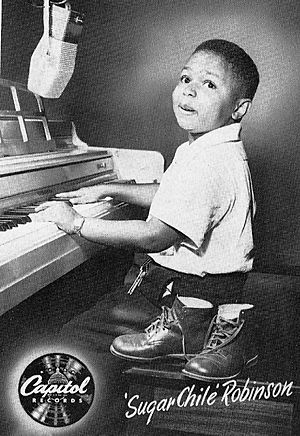Sugar Chile Robinson facts for kids
Quick facts for kids
Sugar Chile Robinson
|
|
|---|---|

Robinson, c. 1950
|
|
| Background information | |
| Birth name | Frank Isaac Robinson |
| Also known as |
|
| Born | December 28, 1938 Detroit, Michigan, US |
| Genres | |
| Occupation(s) | Musician |
| Instruments |
|
| Years active | 1945–1959; 2002–2014 |
| Labels | Capitol |
Frank Isaac Robinson (born December 28, 1938), known as Sugar Chile Robinson, is an American jazz pianist and singer. He became famous as a child music star in the 1940s. He was born in Detroit, Michigan.
Contents
Early Life and Amazing Talent
Frank Isaac Robinson was born in Detroit, Michigan. He was the youngest of seven children. His father was a truck driver. The family later owned a neighborhood store.
Frank showed incredible talent from a very young age. He could say the alphabet at just six months old. He was reading by age three. Even before he turned two, he was singing the blues and playing the piano. He taught himself to play. He even used his elbows and fists to hit the keys!
At age three, Frank won a talent show. This show was at the Paradise Theatre in Detroit. He was very small, weighing only 40 pounds at age seven. Because he was so small, he often played the piano while standing up. His mother passed away when he was about five years old.
After his childhood music career, Frank went to college. He earned degrees in history and psychology.
A Star is Born: His Music Career
In 1945, Sugar Chile Robinson played as a guest with famous musician Lionel Hampton. Child protection laws stopped him from touring with Hampton. However, he performed on the radio. He also appeared in a Hollywood movie called No Leave, No Love.
In 1946, he played for President Harry S. Truman. This was at a special dinner at the White House. During his performance, he famously shouted, "How'm I Doin', Mr. President?" This became his well-known catchphrase. He was the first African American performer to play at this annual dinner.
Sugar Chile started touring big theaters. He set new records for ticket sales. At his most popular, he earned a lot of money. In 1949, he got special permission to join the American Federation of Musicians. He then recorded his first songs for Capitol Records. These songs were "Numbers Boogie" and "Caldonia." Both became hits on the Billboard R&B chart.
In 1950, he toured and appeared on television. He performed with the legendary Count Basie. He also appeared in a short film with them. The next year, he toured the United Kingdom. He performed at the famous London Palladium.
He stopped recording new music in 1952. He continued to play jazz sometimes until 1956. By 1959, he ended his music career. He later explained that he wanted to go to school. He really wanted to get a college diploma.
Life After Childhood Stardom
In the 1960s, Frank Robinson worked for a TV station called WGPR-TV. He also helped start small record labels in Detroit. He even opened his own recording studio. He also worked at his parents' store.
Returning to the Stage
In recent years, Sugar Chile Robinson has played music again. The American Music Research Foundation helped him. In 2002, he played at a special concert in Detroit. In 2007, he went to Britain for a rock and roll festival. In 2013, he was the main artist on a show called Dr Boogie. This show featured his classic songs and told his life story.
Awards and Special Moments
On April 30, 2016, Sugar Chile Robinson attended the White House Correspondents' Dinner again. This was 70 years after his first performance there. He met President Barack Obama. He received a standing ovation as his childhood picture appeared on video screens.
In 2016, Robinson was honored. He was inducted into the Rhythm & Blues Music Hall of Fame. In 2020, his 1955 song "Go Boy Go" was used in a GMC car advertisement.
Personal Life
After his childhood music career, Frank Robinson had a trust fund. This fund was set up when he was a child. He lived a simple life as a young adult. He lived in an apartment with his sister above their family store.
In 2013, Robinson lost his belongings in a house fire. This caused him financial problems. The Music Maker Relief Foundation helped him. They sent him a bed and gave him monthly support. A musician named Buddy Smith, who was inspired by Sugar Chile in the 1940s, sent him a piano.

